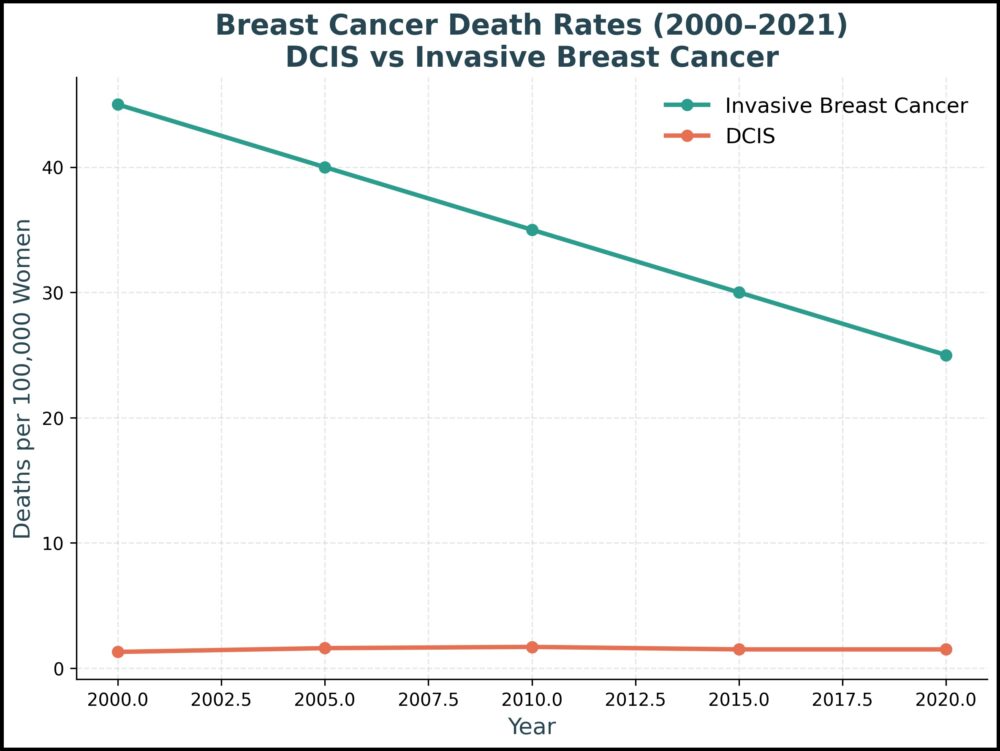Category: Latest Research
-
February 4, 2026

Is Tamoxifen Alone Without Surgery a Viable Strategy for Low-Risk DCIS?: Updates From the LORETTA Trial
In December 2025, results from the LORETTA trial were presented at the San Antonio Breast Cancer Symposium (SABCS), offering new insight into an important and long-standing question in DCIS care: Can some people with low-risk DCIS safely avoid surgery?
While the trial did not meet its predefined statistical threshold, the findings add meaningful evidence to the growing body of research suggesting that active surveillance may be appropriate for carefully selected patients. Importantly, the results help clarify who those patients might be.
-
January 10, 2026

New DCIS Radiation Findings Presented at SABCS: What High-Risk Patients Should Know
At the San Antonio Breast Cancer Symposium (SABCS) in December, researchers presented updated results from a large international clinical trial examining radiation treatment after surgery for ductal carcinoma in situ (DCIS). The study offers important insights into how radiation can reduce the chance of DCIS returning in the same breast — particularly for people considered at higher risk of recurrence.
-
December 19, 2025

Reflections from the 2025 San Antonio Breast Cancer Symposium
Last week, DCIS Understood had the opportunity to attend the San Antonio Breast Cancer Symposium (SABCS) — one of the world’s most important gatherings dedicated to breast cancer research and care. We returned feeling energized, inspired, and deeply grateful to be part of a global community working toward better outcomes and more thoughtful, patient-centered care.
-
November 13, 2025

Can Biopsy Alone Help Identify Which DCIS Is Truly “Low Risk”?
For many women diagnosed with DCIS, one of the toughest questions is whether surgery is truly necessary — especially if the DCIS looks low-risk. The idea of active monitoring (close follow-up with imaging and exams, without immediate surgery) is gaining attention in clinical trials. But one challenge remains: how can doctors be sure a biopsy really shows the whole truth about the DCIS?
-
October 20, 2025

Polygenic Risk Score May Help Personalize Risk Prediction for DCIS and LCIS
When someone is diagnosed with ductal carcinoma in situ (DCIS) or lobular carcinoma in situ (LCIS), one of the toughest questions is: What happens next? Not all in situ lesions progress to invasive cancer, yet many people feel pressure to treat aggressively for fear of missing something.
A new study from the American Association for Cancer Research suggests a promising—but still tentative—tool: a polygenic risk score (PRS), a number based on hundreds of inherited genetic variants. This approach may someday help personalize risk predictions for future breast events after an in situ diagnosis.
-
October 14, 2025

Are Death Rates from Breast Cancer After Initial DCIS Diagnosis Going Down? A New Study Raises Questions
When we talk about progress in breast cancer, we often point to the encouraging news that deaths from invasive breast cancer have steadily declined over recent decades—thanks to advances in detection, treatment and care.
But for DCIS, there is weak or even no evidence that our current treatments actually reduce the chance of dying from breast cancer. A new study published in Breast Cancer Research looked closely at this question, and the results raise important concerns.
-
September 29, 2025

A New Clue to Why Some DCIS Becomes Invasive Cancer
One of the biggest questions for people diagnosed with DCIS is: which cases will stay harmless inside the milk ducts, and which ones will progress to invasive breast cancer?
A new study from researchers in Finland and Sweden offers an important piece of this puzzle. They discovered that a protein called HSF2 may act like a “switch” that helps determine whether cells stay put in the ducts or begin invading surrounding breast tissue.
-
September 3, 2025

Dutch Study Brings Reassuring News About Long-Term Outcomes for DCIS Patients
A new study from the Netherlands offers encouraging news for women diagnosed with ductal carcinoma in situ (DCIS). Researchers followed nearly 19,000 women diagnosed between 1999 and 2015 and looked at how many went on to die of breast cancer over the next decade. The results may surprise you: only about 1.3% of women died from breast cancer within ten years of their DCIS diagnosis. This suggests that, while DCIS carries some risk, the vast majority of women will not die of breast cancer in the decade following their diagnosis. The study also compared women with DCIS to the general population….
-
July 18, 2025

Is It Safe to Wait? What a New Study Says About Delaying Surgery for DCIS
When you’re told you have ductal carcinoma in situ (DCIS), the instinct is often to treat it quickly and aggressively. But what if some DCIS doesn’t need immediate surgery at all? A new study published in The BMJ (British Medical Journal) suggests that for some women, waiting and watching may be a safe option. In this observational cohort study, researchers followed 1,780 women across the U.S. who were diagnosed with DCIS but chose not to have surgery within the first six months of diagnosis. The goal was to understand how many later developed invasive breast cancer and how many died from breast…
-
July 10, 2025

Endocrine Therapy for 2+ Years May Be as Effective as Radiation for Some DCIS Patients
Ductal carcinoma in situ (DCIS) is often found through screening before it has a chance to spread. While this sounds reassuring, it leads to a tough question: how much treatment is enough? Most DCIS patients undergo surgery, often followed by radiation and/or hormone (endocrine) therapy. But not all DCIS is aggressive, and over-treating low-risk cases can cause unnecessary side effects. This new study, published in NPJ Breast Cancer, takes a fresh look at how long endocrine therapy needs to be taken—and whether it might offer similar protection as radiation. Researchers analyzed 1,916 patients from two large California cancer centers, with a…










Subscribe below for the latest DCIS news and updates.